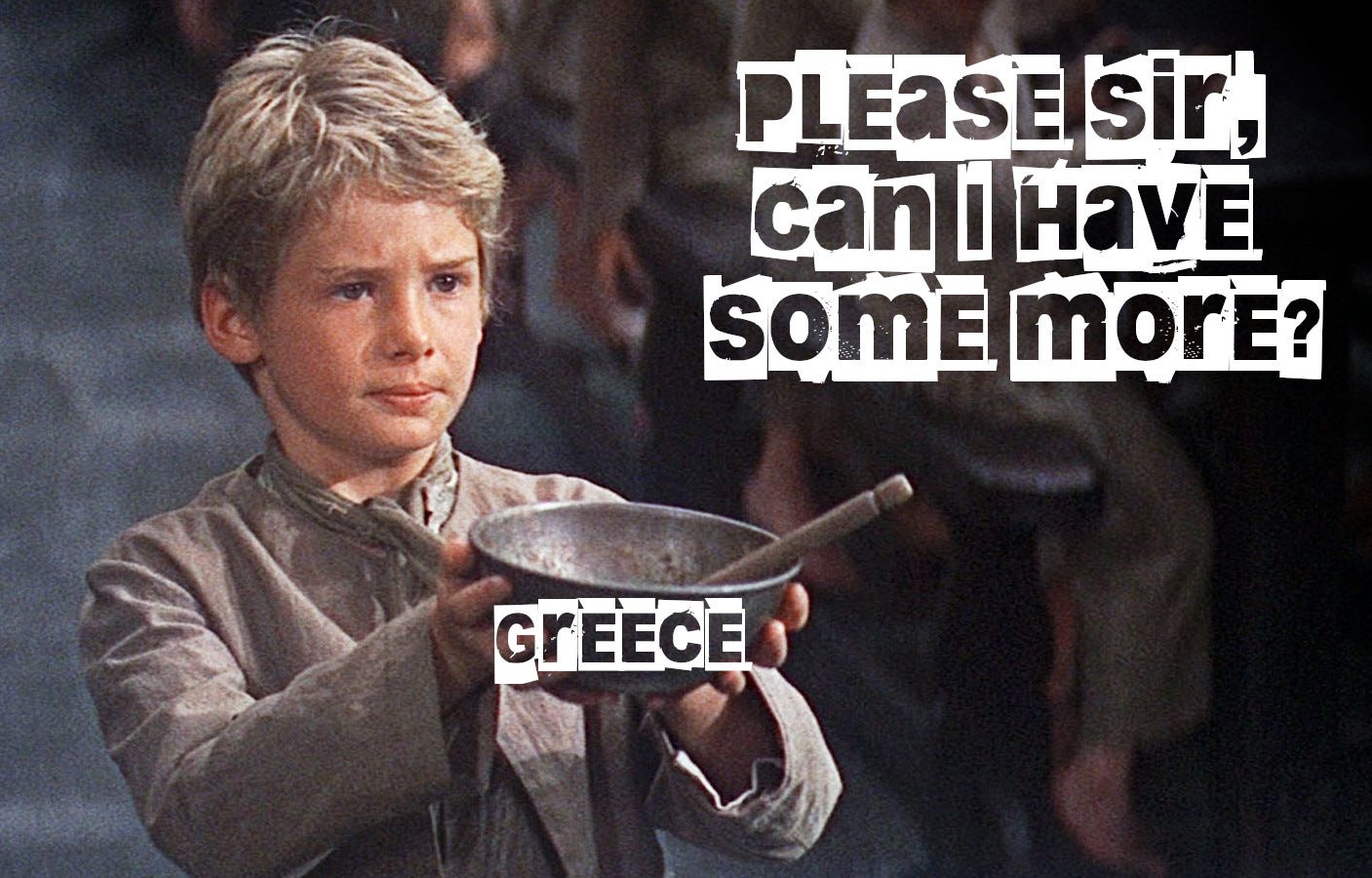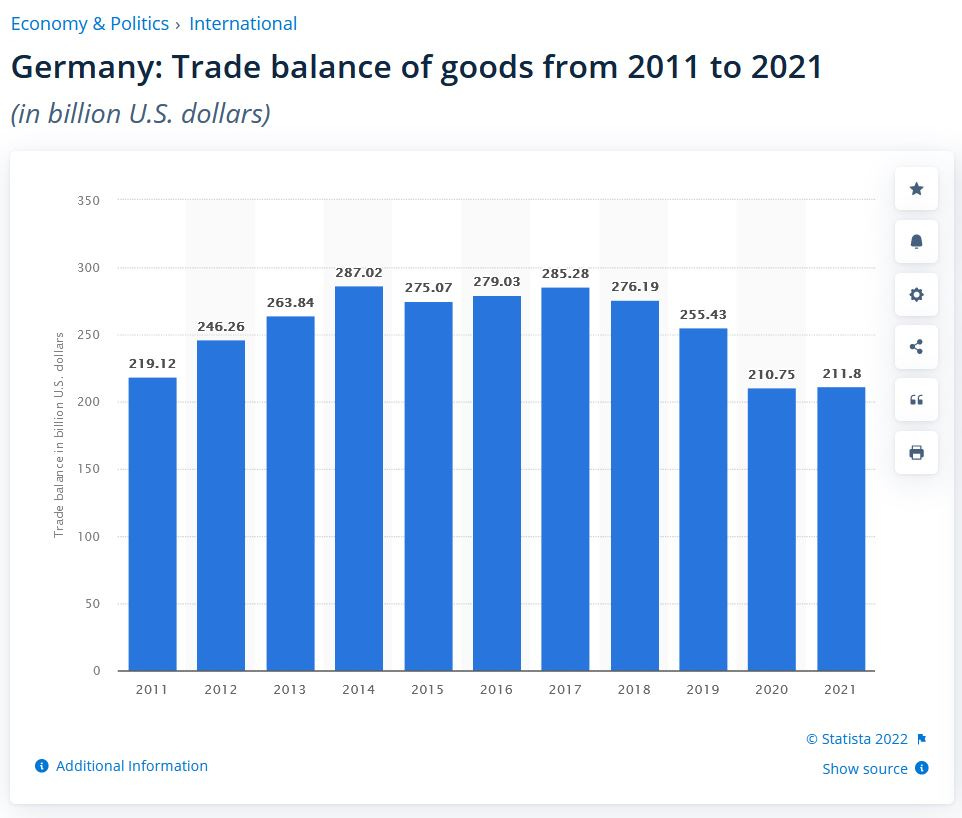Here's why Germany secretly loves bailing out Greece...
A trade surplus and managing the strength of the Euro
For the longest time I could never figure out why fiscally prudent Germany keeps bailing out Greece. I understand the argument that the bail outs are necessary to keep the Eurozone intact, however, I never found that answer fully satisfying. I wanted to understand what was really going on…
The first clue came about a year ago, when I heard an economist say that Germany has gained way more from the Euro than they’ve ever spent tossing a lifeline to its weakest members. I didn’t understand that argument then, but I think I do now. It’s actually pretty simple but to explain it first we should have a quick look at trade deficits and surpluses.
Trade surplus
A trade surplus means that a country exports more goods than it imports. All of the places you think of as being manufacturing giants, like Japan, China and Germany, have a trade surplus. Below is a chart of Germany’s trade surplus for the last 10 years. Recently the surplus has tipped into deficit* due to the energy crisis, however, if you averaged the last 10 years you would get an annual surplus of roughly $250 billion. No small sum!
*Will Germany’s robust manufacturing sector recover? Or is this a start of a secular trend in which firms leave Deutschland and head to greener pastures? That will depend on what steps Germany takes to address its energy security problem.
Trade deficit
A trade deficit means that a country imports more than it exports. The United States has a gargantuan trade deficit since it buys products from all over the world but doesn’t export much in return (except dollars). If we take this chart you can see that the US is looking at an annual trade deficit of roughly $500 billion.
Currency wars
A trade surplus goes hat in hand with a strong currency, because foreigners need to buy the local currency to pay for the goods manufactured in that country. A strong currency, that’s great right? Well, not so fast. If a currency’s value rises it makes that country’s products more expensive. A country can become so successful that it prices itself out of the market. That’s why nations with a large trade surplus must take steps to artificially weaken their currency.
Let’s imagine a scenario where Germany is not part of the Eurozone, and instead has its own currency. I’ll call it the German Gorbleck. Here’s what would happen to Germany if it used the Gorbleck instead of the Euro.
Germany produces the chromed-out Mercs and Beamers that it’s famous for
Russian Gangsters, American executives and British police departments exchange their Rubles, Dollars and Pounds for Gorbleck to buy their fancy German autos. There is a constant bid for German products so the value of the Gorbleck rises
As the exchange rate of the Gorbleck goes up, so does the cost of German products. If 1 Pounds used to equal 1 Gorbleck, after a few years 1 pound only buys .80 Gorcents. Thus all other things being equal, the BMW costs 20% more for foreign buyers
Left unchecked, the currency of any country with a large trade surplus can rise to the point where that country’s exports become priced out of foreign markets. Not good! There are a few ways to handle this.
China has traditionally bought hundreds of billions of dollars worth of US Treasuries. The Swiss National Bank printed gobs of money and bought American stocks. Near the peak the SNB had a portfolio of equities worth over $150 billion. Lately they’ve lost a good deal of that but hey, nobody ever said central bankers are good with money.
As for Japan, they are the largest creditor country in the world, thirty-one years running… Japan takes the money it gets for its products and reinvests that FX overseas. They also have to pay for most of their energy imports, as Japan doesn’t have any noteworthy oil reserves. In fact paying for energy is one solution to an overly-strong currency. I just posted a review of The Prize, where I learned that in the 80s Japan wanted the price of oil to remain high! Because paying more for oil was one way to drive down the value of the Yen.
How the Euro solves Germany’s trade surplus problem
Nineteen countries use the Euro. Some of them are exporters like Germany, but others run a trade deficit like Spain, Cyprus, Portugal, France and Greece. These countries and their trade deficits weaken the Euro compared to where it would be otherwise, given Germany’s massive trade surplus. Thus the Euro has a natural rebalancing mechanism that keeps it from getting too strong. Germany gets all the benefits of being a manufacturing hub, without having to actively manage its currency.
As such, the Germans will complain about Greece and the other EU nations that can’t get their budgets in order, but ultimately Germany will always bail them out because it’s cheaper than buying hundreds of billions of Treasuries (China) or starting a national hedge fund that ends up like an AARK 2.0 (Switzerland).
You could even argue that Germany secretly delights in seeing other Eurozone countries blowup, since it drives down the price of the Euro and makes German exports that much more competitive. In a sentence: the economic weakness and trade deficits of the Eurozone’s weakest countries keep the Euro from appreciating and ensures that German exports remain competitively priced.
Do you agree with what I just said? I would love to hear your take, even if it’s just an explanation of why I’m an ignoramus who doesn’t understand FX.









I worked in Brussels for two years (in the Euro Parliament) and have never heard this explained so cogently. Thank you!